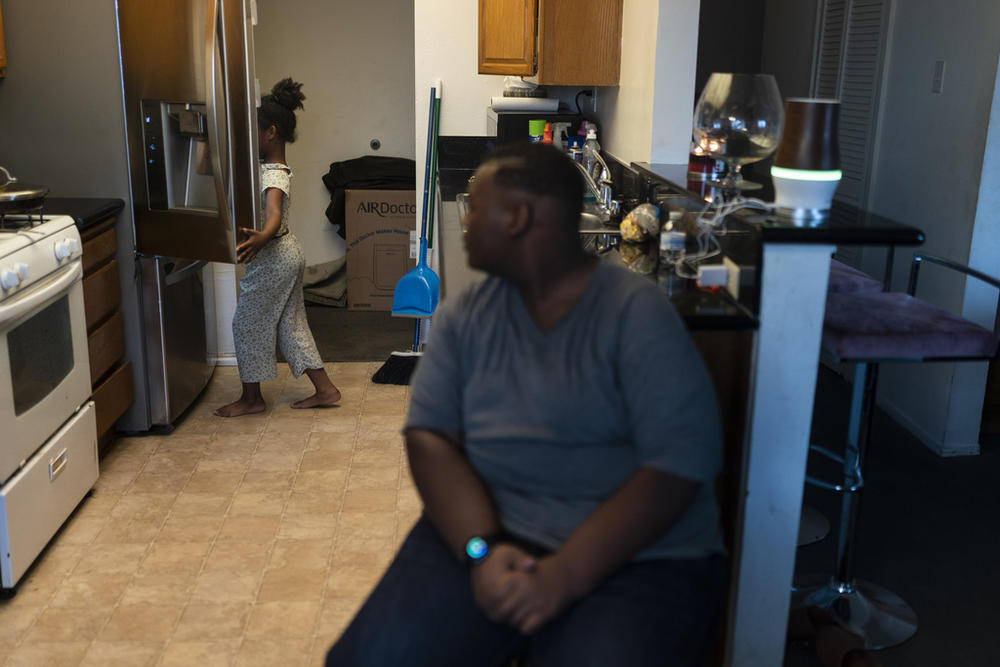
Caption
John Simon, a teenager who had a bariatric surgery in 2022, watches as his sister, Haley, opens a refrigerator for food in their apartment in Los Angeles, Monday, March 13, 2023.
Credit: (AP Photo/Jae C. Hong)
LISTEN: Military and local law enforcement officials say America’s national security is at risk without more investment in early childhood mental health programs. The Council for a Strong America shared its report at the state Capitol earlier this month. GPB’s Ellen Eldridge has more.

John Simon, a teenager who had a bariatric surgery in 2022, watches as his sister, Haley, opens a refrigerator for food in their apartment in Los Angeles, Monday, March 13, 2023.
Investments in early childhood mental health programs are not just important for helping children build a foundation for future education and well-being but also critical for public safety and national security, according to a new report.
The Council for a Stronger America's “Early Childhood Mental Health Is Key to Georgia Kids’ Success” found that educational deficits, crime, substance abuse, and obesity prevent 73% of Georgia youth from qualifying for military service, which makes the country less secure.
Retired U.S. Navy Rear Adm. Casey Coane said early interventions, along with schools and community programs to support healthy brain development, could make the difference in improving childrens' health, ultimately leading to a stronger society and military.
Coane, a Georgia member of Mission: Readiness, spoke at the state Capitol on Feb. 1. along with advocates who want to see more money in Gov. Brian Kemp's budget for programs like Early Childhood Mental Health Consultation.
"We are not unhappy with progress at the state of Georgia has been made," Coane said. "We have a good budget. We have a good legislature. We've made a lot of progress. But this particular area of childhood mental health needs more help."
Experts in children's mental health are available in learning environments through these evidence-based programs that correct problems as they arise, Coane said.
"That kind of program has proven to be effective," he said. "And today in Georgia, consultation programs are being piloted right here in Atlanta, in Savannah, and in Macon."
When infants experience distress and cry, and adults respond by comforting them, infants learn, over time, how to manage their emotions.
Babies and young children who are instead exposed to Adverse Childhood Experiences (ACEs) like substance misuse, mental illness, and violence, are more likely to struggle with early childhood development.
Nationwide, about 9.5 to 14% of very young children have these challenges, but, in Georgia, more than one-fifth (21%) of infants and toddlers experience ACEs, the report shows, and rates are even higher among children of color and those from families with low incomes.
"We can do better than to simply allow 20% of Georgia's young people experiencing adverse childhood events to just fall by the wayside, just as they're starting to develop their being who they really are," Coane said. "So, my thought is they deserve better. Our national security requires that we do better."
Half of all mental illness begins by age 14, and 1 in 6 Americans aged 6 to 17 experience a mental health disorder each year, according to the National Alliance on Mental Illness.
Research has shown definitely that children who receive this kind of intervention are far less likely to be expelled from school, which happens often among kids with adverse childhood events in their past, Coane said.
"If they don't get that anger, that concern, that stress straightened out, they get thrown out of school or placed in other special ed classes, which are more expensive for the taxpayer as well," Coane said. "So, if we don't address this early, we really have a problem."
Almost 200 members in the state of Georgia will have joined Fight Crime: Invest in Kids by the end of the year, said Atlanta Public Schools police Chief Ronald Applin, who is also a member.
He cited a 19-year study that found children who were aggressive in preschool had high delinquency rates at age 23.
"If we invest in our kids, we're fighting crime at the end of the day," Applin said. "And I'd rather do that earlier rather than later."